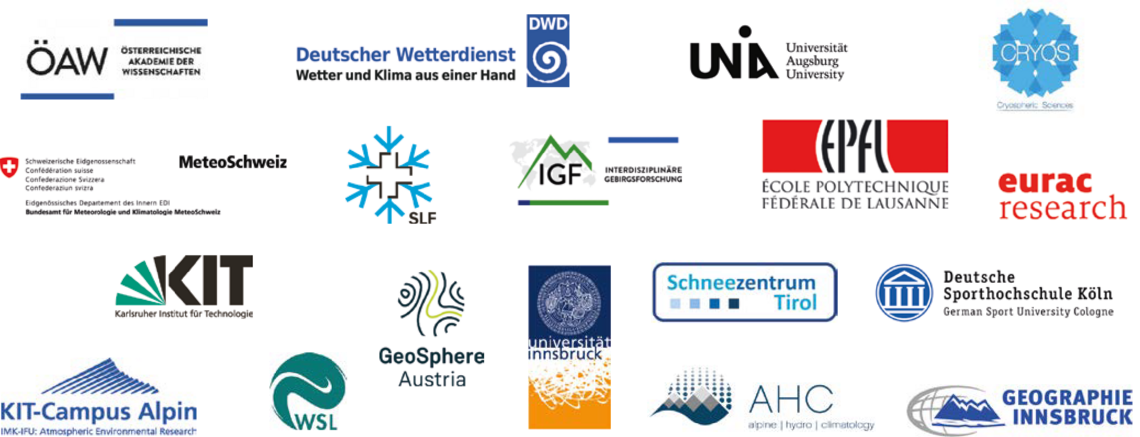Effects of climate change on winter and mountain sports
The expert forum ‘Climate.Sport.Snow’ (14 climate and sports research institutions from Germany, Austria and Switzerland) published the current state of research on the topic of ‘Prospects for winter and mountain sports in the face of global climate change’. The aim is to create a basis for an objective discussion so that optimal measures can be taken for nature, people and the economy in the long term.
In 2019 and 2022, the ‘Climate.Sport.Snow’ expert forum published the first two position papers. For the third position paper, which has just been published, the experts incorporated the latest research findings and expanded the topic area from winter sports to include mountain sports in the summer months. Knowledge deficits and approaches for action were also summarised.
GeoSphere Austria is represented in the ‘Climate.Sport.Snow’ expert forum by Marc Olefs, Head of the Climate Impact Research Department.
The climate has warmed significantly in recent decades. According to the latest calculation methods, the average warming since pre-industrial times will be 2.5 °C in Germany, 3.1 °C in Austria and 2.9 °C in Switzerland by the end of 2024.
The experts at the ‘Climate.Sport.Snow’ expert forum are unanimous in their expectation that, despite the implementation of global climate protection measures, the average annual temperature in the D-A-CH region will rise by at least another 2 °C by the end of the century.
The long-term climate trend caused by further increases in greenhouse gas emissions is clearly overlaid by natural climate variability. Particularly on short (from year to year) and medium (20 to 30 years) time scales, these sometimes marked fluctuations can both strengthen and weaken the long-term trend regionally.
‘Warming is having a significant impact on winters,’ says Marc Olefs, head of the Climate Impact Research department at GeoSphere Austria, ‘the natural snow cover suitable for snow sports is continuing to decline in the long term, particularly at low and medium altitudes, up to around 1500 metres above sea level. Warming is also changing the meteorological conditions for technical snow production. The potential snowmaking times are decreasing and the demand for water and energy is increasing.’
Natural variability is particularly high in winter precipitation and no clear trends can be observed in many places. However, the current climate scenarios show robust signals regarding an increase in winter precipitation in the Alpine region and the intensification of short-term precipitation extremes. However, a further decrease in snowfall is to be expected at low and medium altitudes, as precipitation increasingly falls as rain instead of snow due to the higher temperatures.
In the transitional seasons of spring and autumn, climate change contributes to an extension of the season for many outdoor activities, such as hiking, cycling, swimming, water sports and golf. In summer, however, the impact of rising temperatures also increases.
As far as rain is concerned, there are two developments:
‘Climate scenarios for the Alpine region show a trend towards lower rainfall over the entire summer half-year. In conjunction with the increased evaporation rates due to rising temperatures, this leads to an intensification of summer drought episodes,’ explains climate researcher Marc Olefs from GeoSphere Austria, ‘at the same time, however, it is to be expected that small-scale and short-term heavy precipitation will continue to intensify and increase in frequency in the summer half-year. Among other things, this can lead to an accumulation of other alpine natural hazards such as mudslides and landslides, with effects on the alpine road networks and other infrastructure.’
In the new position paper, the team from the ‘Climate.Sport.Snow’ expert forum also lists areas with uncertainties and a need for research.
Some examples:
- There is growing evidence of an increase in long-lasting weather patterns due to changes in atmospheric circulation. However, many of the underlying mechanisms are still poorly understood.
- While temperature forecasts are relatively reliable, there are major uncertainties regarding precipitation trends. Improved data is urgently needed, including new measuring methods and more measuring stations at higher altitudes.
- Abrupt changes in components of the climate system, such as the Atlantic overturning circulation (AMOC), pose a serious risk as climate change progresses. The process understanding and time scales of such tipping points still need to be researched in greater depth.
- Local phenomena such as temperature inversions and the lowering of the snow line in valleys should be investigated in more detail, as they can have a major impact on snow cover.
‘Climate change is a major challenge. It is in the long-term interest of winter and mountain sports that sustainability, climate protection and increased resilience are promoted synergistically at all levels,’ says the initiator of the Climate.Sport.Snow expert forum Ralf Roth, from the Institute for Outdoor Sport and Environmental Research at the German Sport University Cologne, ‘our approach is thus detached from short-term thinking and planning and is an expression of responsibility for future generations of sport and tourism. The entire industry - cable car operators, sports tourism companies, winter and mountain sports associations, the sporting goods industry, sports retailers and destinations with their guests - is therefore called upon to actively participate in the overall social challenge of climate change with appropriate measures to reduce greenhouse gas emissions and adapt to the consequences.’
Translated with DeepL.com (free version)

